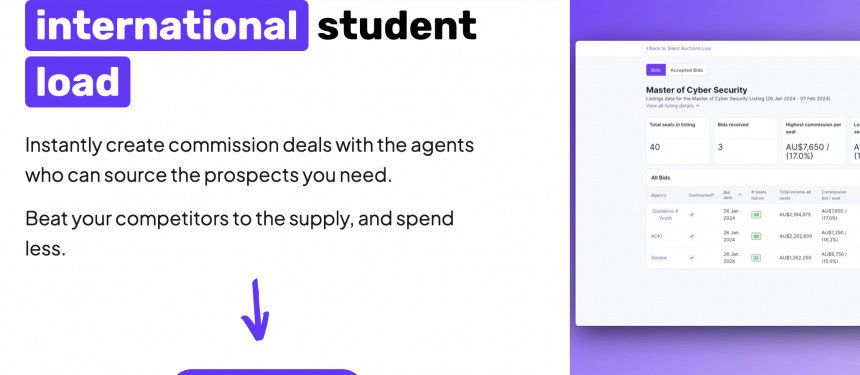A new platform that brokers dynamic agreements on commission and enrolment targets between an institution and agent is gaining traction in the market, as it links supply and demand conditions in real-time.
Feezy changes how providers agree commission and secure load pipelines with agents.
The granular approach allows institutions to tweak commission terms on a per-place basis, considering variables such as course demand, time of year, tuition fee and percentage commission share and global exchange rates.
The platform does not act as an agent or aggregator itself – it is designed to be a procurement tool.
Feezy doesn’t replace agent-institution agreements either, instead it replaces the schedule for the commission agreement through the platform. All the provider’s standard terms and processes including payment timelines, admissions compliance and quality assurance remain unchanged.
John Connolly, founder of Feezy, spoke to The PIE to explain the concept, saying, “traditional agent contracting is static and siloed.
“Most agreements last several years and there’s zero competition on commission values. This has created a passive supply system instead of one that lets providers react to changing market conditions.
“Static contracting increases agent acquisition costs and erodes financial margins.
“It’s well documented that institutions in several destination markets are in financial distress that’s directly attributable to falling international fee income and spending unprecedented amounts on agent commission as it’s one of the few levers available to them.”
With the annual procurement costs of agents reaching tens of millions of pounds/dollars in recent years, the sales culture in international education is suddenly under both government and public scrutiny.
Feezy believes that the current agent commission model is unsustainable and also counter-intuitive to the strategic aims providers wish to achieve, including attracting diversity of academic interest, level and nationality.
“Agents place more business students because demand for business programs is higher, so sourcing prospects is easier,” explains Connolly.
“The commission earned is also higher because tuition fees are set by universities based in largest part on course demand.
“Where’s an agent’s incentive to seek-out arts and humanities prospects in that system? As a result, we see higher bonuses and lavish familiarisation trip as a way of compensating for an outdated contracting approach.”
Connolly has worked for a wide range of major institutions in international recruitment roles including the University of Sheffield, Aston University, University of Adelaide and the Australian National University.
Having witnessed first-hand the outdated contracts and procurement processes used by universities, he is only too aware of the room for improvement.
Dynamic pricing linked to demand transformed the travel industry more than 30 years ago through the internet, yet international education sales contracts have remained largely unchanged.
“Some providers will still be operating with 10-year agent agreements”
“If private enterprise had been here with fresh eyes earlier, we’d have seen dynamic contract terms by now,” Connolly reflected.
“We’ve lost count of the number of leaders in other sectors who can’t believe the way agent contracting works when it’s explained to them. They find it bizarre in an age when the prices for literally everything we buy fluctuate with supply and demand levels or are renegotiated daily or weekly.
“Some providers will still be operating with 10-year agent agreements. Their ability to respond to external factors is limited.
“There’s significant potential to cut costs and capture more of a constrained market supply through dynamic commission pricing if providers tweak how commission terms are agreed. It just takes a conscious choice to innovate. Leaders need to ask themselves, ‘if not now, when?’”
Early adopters to Feezy have been institutions wishing to performance manage agents for specific target courses.
The platform does however allow recruitment agents to join and solicit their services as prospective partners for recruitment specifics.
Are you using the Feezy platform? Is it helpful in improving the service-level agreement between institutions and agents relating to course demand and commission? Have your say in the comments below or by emailing editorial@thepienews.com












